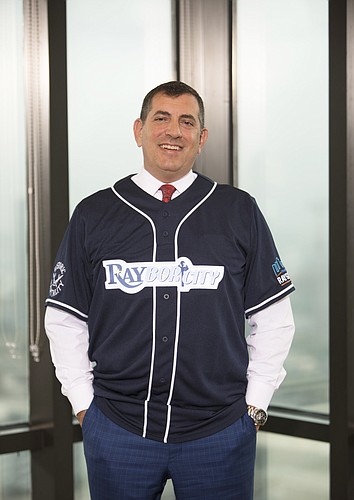- March 29, 2025
-
-
Loading

Loading

Eight years … 96 months … 417 weeks … 2,920 days … two presidential terms — any way you slice it, eight years seems like a long time.
But in the context of St. Petersburg’s relationship with the Tampa Bay Rays and how long it would take to secure a new stadium for the Major League Baseball team, eight years has begun to look like eight too few.
The Rays’ Tropicana Field lease expires in 2027 — after which the team would be free to decamp to baseball-hungry Portland; Las Vegas; Raleigh, N.C.; or north of the border in Montreal. Montreal has already been courting the team as part of a radical plan that would see the Rays become a part-time Tampa Bay resident, playing the first half of the MLB season in Florida before heading north for the summer.
Rays majority owner Stu Sternberg has aggressively pushed the split-season plan as the only way to save Major League Baseball in the Tampa Bay region, calling for new, open-air stadiums to be built in both cities. He seeks to put the plan into action in time for the 2024 or 2025 season.
“I like Montreal — it’s a great city,” says Tampa attorney Ron Christaldi, a leading advocate for moving the Rays to Tampa. “But I don’t see a whole lot of connectivity between Montreal and Tampa. I haven't seen any fiscal analysis, so I don't know really whether it's plausible or not. But it doesn't seem to me to be the best choice.”
Christaldi, a partner at Shumaker, Loop & Kendrick LLP, is one of the leaders of Tampa Bay Rays 2020, a group of professionals who want to galvanize support for keeping the team in the Tampa Bay region, full time, for generations to come. The group backed a plan to build a domed stadium in Ybor City that would cost $892 million. But the deal collapsed in December 2018, days before the closure of the team’s three-year window granted by the St. Petersburg City Council and Mayor Rick Kriseman to search for a new home.
“I think 2020 is the year that the Rays’ future gets charted,” Christaldi says. “There’s been a long pause, but now everybody needs to roll up their sleeves, figuratively break bread again and say, ‘OK, we’ve got this.’”
“I like Montreal — it’s a great city. But I don’t see a whole lot of connectivity between Montreal and Tampa.” Ron Christaldi, a Tampa attorney and leader of Tampa Bay Rays 2020
However, Kriseman announced in early December that St. Petersburg would not allow the Rays to pursue the split-season plan prior to 2027. That provoked Sternberg: He says the team believes in the Montreal arrangement and will prepare to execute it in 2028. Rays officials have declined to comment publicly on the stadium situation, save for Sternberg's comments on the Montreal plan.
“Splitting the Rays season is a loss for this community,” Christaldi says. “It may make sense financially for the Rays. It may be ultimately what happens, but it's a loss for the community … to lose a professional sports team, even half time, is a loss.”
Christaldi remains hopeful, though, and says the Ybor City stadium deal could be revived. Tampa has a new mayor in Jane Castor and new faces on city council that could bring fresh eyes and ideas — assuming Sternberg will agree to drop the Montreal plan. And Kriseman, though not budging on the Trop lease, has signaled a willingness to again let the team explore sites across the bay if that’s what it takes to keep baseball in the region.
The attorney also says stadium funding isn’t the deal killer that it was thought to be. By Christaldi’s calculations, the shortfall was somewhere around $80 million.
“Eighty million dollars is nothing to sneeze at,” he says. “But it’s not an insurmountable thing. It’s not a reason not to do a deal, particularly now, when we have a new governor who played baseball at Yale. He’s a baseball guy. I don’t know that the state would commit anything, but even if you got $1 million a year for 30 years, that’s $30 million toward your $80 million.”
Tampa Bay Rays 2020 lined up $16 million in annual corporate commitments that could be used to help finance the Ybor City stadium. But many other potential donors shied away, not wanting to throw dollars at a hypothetical project.
“There was a reticence until there was an expression by the government and the Rays that they were going to do it," Christaldi says. "No big brand wants to be a founder of something that goes on to fail or something that becomes a political pariah.”
To read more on the 10 top things to watch out for in 2020, click the links below.